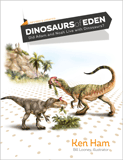News to Note, October 16, 2010
A weekly feature examining news from the biblical viewpoint
ET can’t phone home, let rotting fish lie, Coyne the crusader, and more!
1. Possible Planet with Life Forms
This week:
- ET can’t phone home
- Let rotting fish lie
- Monarch butterfly, PharmD
- An arm-wrestling dinosaur?
- Coyne the crusader
- And Don’t Miss . . .
Did you miss it? Catch last week’s News to Note or any other!
If true, it would be perhaps the most revolutionary discovery in human history: a planet twenty light-years from earth that is not only habitable, but that has its own life-forms. There’s only one problem: scientists aren’t even sure the planet is there.
2. Rotting Fish and Creationists
How can rotting fish join the origins battle on the creationist side?
3. Monarch Butterflies Prescribing Medicine for Offspring
Monarch butterflies are famous for their distinctive coloration and multigenerational migration. Now, they may become famous for something else: prescribing medicine for their offspring.
4. Hybrid Dinosaur
T. rex is one of the best-known dinosaurs, and among the things T. rex is known for are its almost humorously short, weak arms. Many herbivorous dinosaurs, meanwhile, had four powerful legs but no arms. But a newly discovered dinosaur appears to have been something of a hybrid: it stood on only two hind legs, like T. rex, but sported arms with powerful hands.
5. Science and Religion
If you’re religious, science isn’t for you—and vice versa, according to evolutionary biologist (and staunch creationist critic) Jerry Coyne.
And Don’t Miss . . .
- Fetal twins are social beings, according to new research that shows (through ultrasound techniques) twins touching one another in their mother’s womb, “movements, such as stroking the head or back, [that] last[ed] longer and [were] more accurate than self-directed movements, such as touching their own eyes or mouths.” The discovery shows again that even the unborn child is a living human, not just a lump of cells.
- “Saturn’s Largest Moon Has Ingredients for Life?” Given item , that headline should raise red flags; National Geographic News reports on further investigation of basic organic molecules that may be present on Saturn’s moon Titan, fueling not hopes of life on Titan, but rather inspiring evolutionists with another scenario for how life supposedly formed on our own planet.
- The BBC has been instructed to be more impartial in its reporting on science, according to new editorial guidelines. But with climate change skeptics worried that the new guidelines will prompt few changes, creationists can only assume similar (mis)treatment.
- Buy into the evolutionist’s worldview and say goodbye to emotional sincerity? That seems to be the import of skeptic Michael Shermer’s naturalistic deconstruction of empty-nest syndrome presented in USA Today. For Shermer, humans are but robots whose emotions are merely the manifestation of sex- and survival-driven natural selection.
- Mars’s Melas Chasma canyon is, in certain places, almost six times deeper than Earth’s Grand Canyon, and as with Grand Canyon, scientists are confident that “water played a role in its history.” Yet many scientists seem far more willing to embrace catastrophic geology to explain canyons and other formations on Mars than they are on Earth.
- We reported earlier this year on the censure of an Israeli scientist (serving as chief scientist for the Education Ministry) who had made controversial statements disputing human causation of global warming and encouraging students to question evolutionary theory. He has now been fired.
- It’s another evolutionary problem we learned about only after it was “solved”: the “‘cost of complexity’ conundrum.”
- U.S. scientists are at last ready to test embryonic stem cells in clinical therapy. A treatment designed for those with spinal cord injuries will be tested first, at a hospital in Atlanta. Meanwhile, stem cells derived from adults—which do not carry the ethical problems and ambiguities of embryonic stem cells—have already been employed in successful therapies.
- Want to visit the tree Zacchaeus climbed up to gain a better view of Jesus (Luke 19)? The ancient sycamore that’s thought to be a part of biblical record is on Russian property in Palestinian Jericho, a city that will soon celebrate what it claims is its 10,000th birthday (but perhaps they’re off by a few thousand years!).
- The debate about over-hyped “missing link” Ida may have died down once again, but it hasn’t gone away completely; our guess is it will be back in the news eventually, perhaps with a belated defense of the embattled initial claims.
- Have scientists “recreated” the big bang in Europe’s Large Hadron Collider? Not by a long shot; for more, see A Miniature Big Bang or More Hot Air?
For more information: Get Answers
Remember, if you see a news story that might merit some attention, let us know about it! (Note: if the story originates from the Associated Press, Fox News, MSNBC, the New York Times, or another major national media outlet, we will most likely have already heard about it.) And thanks to all of our readers who have submitted great news tips to us. If you didn’t catch last week’s News to Note, why not take a look at it now? See you next week!
(Please note that links will take you directly to the source. Answers in Genesis is not responsible for content on the websites to which we refer. For more information, please see our Privacy Policy.)
Recommended Resources

Answers in Genesis is an apologetics ministry, dedicated to helping Christians defend their faith and proclaim the good news of Jesus Christ.
- Customer Service 800.778.3390
- © 2024 Answers in Genesis





